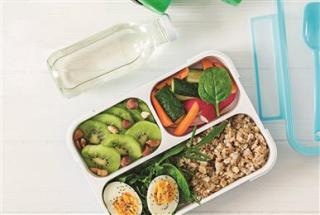With its two new compound series, FC/CM1 and FC/CM2, KRAIBURG TPE meets the most important set of rules on applications with food contact: Commission Regulation (EU) No 10/2011 and Code of Federal Regulations Title 21 (21CFR) of the U.S. Food and Drug Administration (FDA). These new series have been especially developed for applications with food contact and additionally provide pleasant touch characteristics and enhanced organoleptic properties. The target applications include reusable packaging, dosing valves and food dispensers.
 The new compounds from the FC/CM1 and FC/CM2 THERMOLAST® K series meet the highest standards for controlled migration behavior of plastics with food contact and are suitable for applications such as reusable lunch boxes, shakers, dosing valves and resealable bowls, etc.
(Image: © 2019 KRAIBURG TPE)
The new compounds from the FC/CM1 and FC/CM2 THERMOLAST® K series meet the highest standards for controlled migration behavior of plastics with food contact and are suitable for applications such as reusable lunch boxes, shakers, dosing valves and resealable bowls, etc.
(Image: © 2019 KRAIBURG TPE)
The customers’ increasing awareness of environmental protection and sustainability has led to continuously growing demand for reusable products. Typical examples are food containers such as lunch boxes, shakers, and bowls with lids, which the seals are often made of thermoplastic elastomers.
The use of these end products, however, requires reliable materials to ensure that they are physiologically harmless for a long-term period. The relevant set of rules for plastics applications with direct food contact – Regulation (EU) No 10/2011 – defines strict limits for permitted migration of the materials’ ingredients in this context. Due to the composition of its compounds, KRAIBURG TPE also meets the requirements of Code of Federal Regulations Title 21 (21CFR) of the U.S. Food and Drug Administration (FDA).
Combined with well-thought-out designs of the end products and new formulation compositions of the FC/CM1 and FC/CM2 series, components will meet the legal migration limits.
“In recent years, we have worked intensively on this matter and invested heavily in the research and development of new TPS compounds intended for food contact use,” says Franz Hinterecker, CEO at KRAIBURG TPE. “In this process, comprehensive analyzes and migration studies have enabled us to determine precise bases for calculating migration properties and transfer them to the formulation of commercial TPS types.”
In this context, Franz Hinterecker also refers to the fact that TPE compounds may show a very complex migration behavior due to their extremely variable composition. “The silver bullet therefore is to tailor the formulations of individual series as precisely as possible to the expected contact media such as edible oils and fatty foods (mayonnaise, dressings and sauces, meat, etc.). To ensure that it works as intended, we took both a holistic and specific approach to the migration potential in formulating the materials.
The newly developed THERMOLAST® K compounds from the FC/CM1 and FC/CM2 series enable a significantly improved migration control as compared to usual TPS – fully in line with the regulatory set of rules mentioned above. Their minimized migration potential makes them particularly suitable for use in applications with direct contact to fatty food.
In addition, the outstanding surface quality and mechanical properties of the new materials from KRAIBURG TPE provide reusable containers and lids with a long service life. Due to the materials’ excellent elastic recovery, they are perfectly suitable for closure systems and dosing valves of food packaging. The two new series provide many possibilities relating to processing technology, thus making it possible to implement even complex geometries. The compounds are now available worldwide.